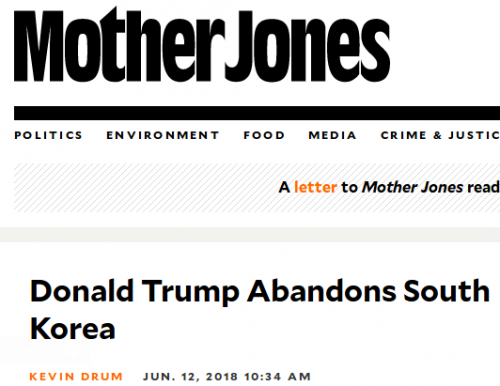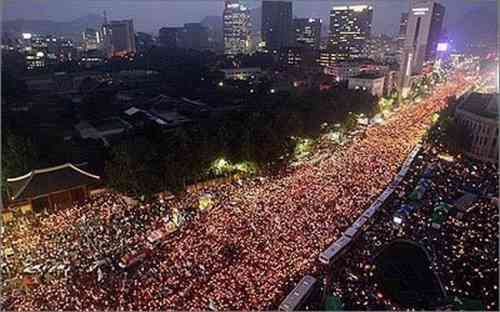When democracy triumphed
America's liberal pundits are outraged at President Trump for actually doing diplomacy with North Korea.
On the other side, America's conservative pundits are heaping praise on Trump for taking a bold step toward peace.
Both sides are idiots.

Trump had virtually nothing to do with making the summit happen.
The credit for that goes to South Korea.
The leaders of North and South Korea held a surprise meeting Saturday, their second in a month, two days after President Donald Trump abruptly canceled a summit meeting with North Korean leader Kim Jong Un.
The two "exchanged their opinions" on among other things successfully carrying out a future US-North Korea summit, according to the statement.
Unlike what Mother Jones is telling us, South Koreans overwhelmingly approve of the summit, by 66-to-11. The South Korean people then went on to give the pro-peace ruling party an overwhelming victory in local elections.
So then the credit for the summit belongs to the South Korean government?
No. The credit belongs to the South Korean people.

And I think that obviously Donald Trump said that he, you know, he’s absolutely getting credit , which is true. And also I think another most important point we have to remember is the President Jae-in, who was elected from the, after the powerful democratic movement, called the candlelight movement.
The Candlelight Revolution was one of the biggest victories for democracy in the world in generations. It got little coverage in the U.S. because the American media doesn't care about the rest of the world, but in South Korea, well, nothing like it had ever happened before.
South Korea’s Candlelight Revolution was the culmination of twenty successive Saturday night rallies that brought out over 16 million people from a population of 51 million. By this spring, Park’s support had fallen to 4 percent, and even that number might have been a statistical aberration.
Just imagine if 1 in 3 Americans turned out into the streets to protest government corruption. How would the American press cover something like that?
Naturally the NY Times said it was all about sexism.
Fortunately, people in South Korea care more about corruption in their government than American sexism.
The scandal that became known as “Choi Soon-sil gate” centered on emerging stories about bribes that President Park received in return for favors to businesses, including one that catapulted an heir at Samsung (which constitutes almost 20 percent of the South Korean economy) into a position to succeed the empire’s throne. The media also reported at the beginning of 2017 that the president had collaborated with her chief of staff and culture minister to create “The Blacklist”: a registry of nearly ten thousand filmmakers, writers, artists, and academics deemed “anti-government” who were denied state funding during President Park’s tenure. Facts and gossip collided in the public sphere, placing “Choi Soon-sil gate” into the hands of South Korea’s parliament, courts, university campuses and classrooms, and free press—all loci of fear during the country’s dictatorship era, which ended only thirty years ago. A series of revelations ultimately led to arrests and jail time for Choi, Park, various ministers and associates of the former president, and, most astounding to Koreans, the “Crown Prince of Samsung,” Lee Jae-yong.
...
Politicians across party lines acknowledged that it was the street protests throughout the country that compelled parliament to make a motion for impeachment. The wide margin in favor of impeachment (234–56) was astonishing, as was the constitutional court’s 8–0 vote to uphold the parliamentary decision.On the streets of Seoul, “The people are sovereign!” signs signaled that, for the first time in South Korea’s sixty-nine-year history, a broad spectrum of society had the chance to steer the country’s course in a nonviolent, public forum.
The people exercising democracy over their government and holding them accountable? No wonder the American media largely ignored this amazing event.
The outcome of this peaceful democratic revolution was a government more responsive to the wishes of the people, and the people of South Korea wanted peace.
Joint exit polls conducted by South Korea's three major TV networks found Democrat Moon to have 41.4 percent of the vote. Conservative Hong Joon-pyo took 23.3 percent and centrist Ahn Cheol-soo took 21.8.Moon favors strengthening ties with North Korea, which the Washington Post notes "could open a new and potentially difficult chapter in relations with the United States" as the Trump administration continues its saber-rattling with the hermit kingdom.
...
Moon is the son of North Korean refugees and previously worked as a human rights lawyer. He has advocated for resuming dialogue with North Korea while maintaining pressure and sanctions, opposing Park, who cut off all ties with the nation.He has also promised to review the previous administration's decision to host an American Terminal High Altitude Area Defense (THAAD) missile system, which has engendered criticism from North Koreans, who see it as an antagonistic move by the U.S., and from local residents, who were angered by President Donald Trump's statement that Seoul should pay for the system.
So you can see a clear line between the power and actions of the people in South Korea to the recent summit.
But don't expect the NY Times, Fox News, or Mother Jones to explain it to you.


Comments
Yes of course.
Thank you for the update on the Candlelight Revolution gjohnsit. And yes of course both sides are idiots. But one party remains opposed to peace here: the Democratic Party. And they're the folks we get to hear from the most.
"the old world is dying, and the new world struggles to be born; now is the time of monsters" -- Antonio Gramsci
Candlelight Revolution in pictures
Please click on this link
from beginning to end
Now compare that to this:
yeah, I was thinking that
very thing yesterday. What if? What if 50,000 people showed up? And, yeah, I think about such crap. And, how long that "march" would be? Turns out, at five people (one lane) wide, it's well over 5 miles long. The M$M would ignore it, of course, becuz that is what it does (march? what march?), but social media would be all over it. Five miles of people! impressive.
the little things you can do are more valuable than the giant things you can't! - @thanatokephaloides. On Twitter @wink1radio. (-2.1) All about building progressive media.
Peace comes from people...not politicians
...and Korea proves it, especially S. Korea. Where the people lead, the leaders will follow.
We might still fuck it up...it isn't past us to do so...but I'm hopeful about it ...and Afghanistan too.
Thanks for the essay.
“Until justice rolls down like water and righteousness like a mighty stream.”
thanks. How many different people demonstrated?
The event was held 20 times
If the same people went every time, then the number of different people would be 15M/20 or less than 1 million.
My guess is say 5 million different people or 10% of the population went to at least one vigil.
That would be 10% of the population.
If that many different people demonstrated in the US, at 10%, it would be 32.5 million.
If there were an event held every weekend until change came about, and the total participation reached 1/3, that would be 108 million people, if we use the same 20 week period with similar numbers.
The largest worldwide demonstration in history was against the Iraq invasion and here is some info from wikipedia
It is not impossible to have an ongoing demonstration like Korea.
I well recall Bernie's announcement that he was running for the presidency and he said it will take millions. I knew he was right, but it sounded like mission impossible.
If Americans realized the cost and consequences of the wars and their contribution to our declining empire, it is possible even here for an anti war movement to make a difference.
well, maybe it will be economic collapse for people to street
an article posted on Zero Hedge
America's Greatest Crisis Upon Us...Debt-to-GDP Makes It Clear
We've already got austerity.
Only the military-industrial complex (MIC) doesn't get the austerity axe. All of the other functions of government have been slashed to the bone, but not the military or its suppliers.
We spend more on military than all other nations on Earth combined.
To put an end to the crisis described by the ZeroHedge writer, we need to do two things: bring the majority of our Nation's business back inside the Nation's borders (and away from Finance/Insurance/Real Estate or FIRE), and stop intervening in the affairs of other countries.
Our role as the world's unpaid policeman must come to an end. When the world doesn't pay for our policing it -- and it doesn't -- we must pay for it. As the ZeroHedge essayist points out, we can't. No nation's ordinary working people can.
The ordinary working-class Western Roman people couldn't afford it, either.....
"US govt/military = bad. Russian govt/military = bad. Any politician wanting power = bad. Anyone wielding power = bad." --Shahryar
"All power corrupts absolutely!" -- thanatokephaloides
No wonder the Dems are freaked out.
https://www.usatoday.com/story/money/2018/06/12/trump-kim-handshake-peac...
"the old world is dying, and the new world struggles to be born; now is the time of monsters" -- Antonio Gramsci
Not to mention NK is now nuclear capable.
And as I've stated before, NK should never give up their only deterrant to US invasion. If the Koreas want to unite on their own, without US involvement, I say let them. The Korean people themselves have been pushing for that for decades, but the American Empire won't allow it because that would go against capitalist interests in the region.
Modern education is little more than toeing the line for the capitalist pigs.
Guerrilla Liberalism won't liberate the US or the world from the iron fist of capital.